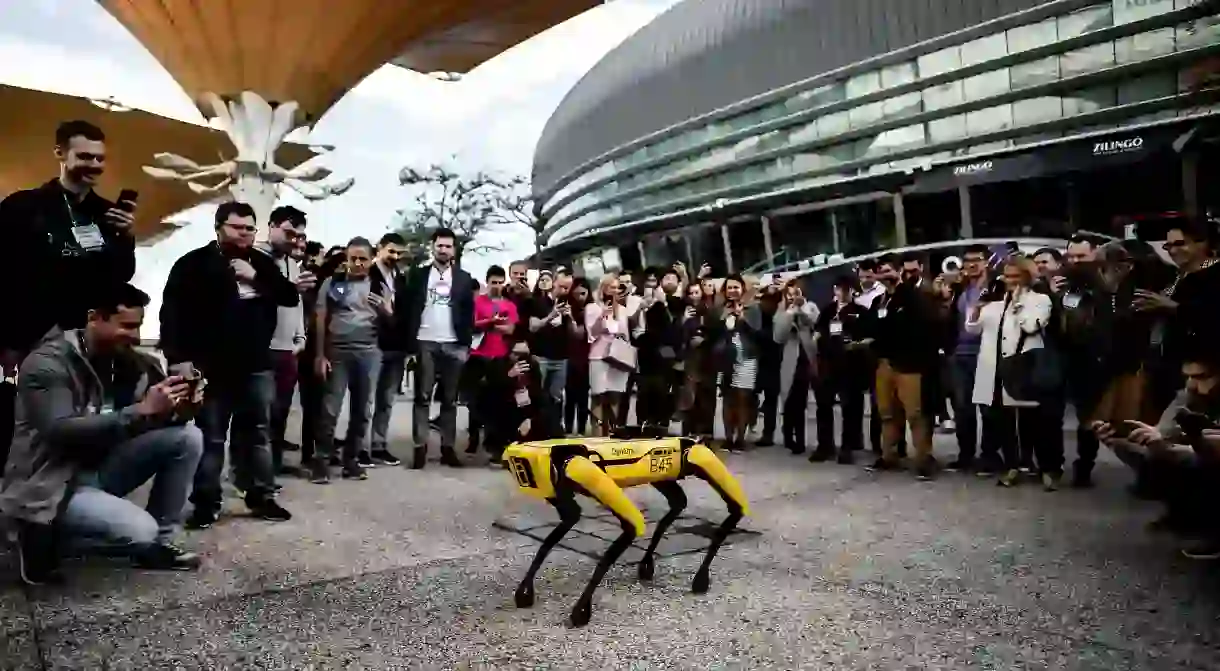Robots Helping in the Fight Against Covid-19

A global lockdown in the midst of a widespread pandemic sounds like a story plucked straight out of the head of Black Mirror creator Charlie Brooker. But robot dogs patrolling parks to control social distancing? We report on the hi-tech kit that’s helping in the fight against coronavirus.
Robot dogs actually did patrol parks in a Black Mirror episode, Metalhead. In that instance it did not end well. However, along with other state-of-the-art technology, robot dogs are actually on humanity’s side in the effort to contain Covid-19. Here are some of our favourite examples of how robots are being deployed.
Singapore robot dog
No, it’s not a machine gun mounted on a dog-shaped robot. It’s a 360-degree camera. The Singaporean government released the machine, named Spot, into Bishan-Ang Mo Kio Park on a two-week trial, with a mission to remind park dwellers to maintain social distancing. The robohound, built by US robotics firm Boston Dynamics, gently announces messages such as: “For your own safety and for those around you, please stand at least 1m apart. Thank you,” and, “Let’s keep Singapore healthy,” when it detects a compact group of people. Spot is controlled remotely to reduce physical contact and uses analytics to report the number of people in the park.
Chinese hospital robots
Guangdong Provincial People’s Hospital in Guangzhou, southern China, has deployed a pair of R2-D2-like robots to assist their medical teams, as reported by the South China Morning Post. Their functions include delivering medicines, meals, quilts and clothes; disinfecting hospital rooms, and checking people’s temperatures from a distance. Each bot can take the temperatures of around 10 people simultaneously. When it detects an abnormally high temperature, a built-in camera takes a photograph and reports back to the hospital. These automatons not only ease the burden on medical workers, they also help to reduce the risk of infection in a highly contagious hospital environment.
Temi nurses
Thousands of devices, called Temi, are being used in hospitals and care homes around the world, theBBC reports. Hong Kong, China, Japan, Korea and the US are using this screen on wheels to interact with contagious patients. The bots move autonomously from patient to patient, providing remote video chat with doctors; they can also take temperatures from up to 60cm (2ft) away. The screen can be used to video-call family members and friends at home who are currently not allowed to visit hospitals and care homes because of contagion risk. These AI-embedded, voice-activated devices can run on Alexa and other voice platforms.
New York information robot
In February, a person-shaped robot with an electronic smiley face was deployed in New York City’s Times Square to share information to passers-by about coronavirus. Philadelphia tech company Promobot created the machine with a test software, asking questions such as: “Do you have a temperature?”, and “Do you have a headache?” The robot then announces: “Your symptoms show that your health may be at risk” – or not.
Surgical arm
Researchers at Tsinghua University in China have developed an advanced robotic device to carry out health tests such as ultrasounds, mouth swabs and temperature checks on patients thought to have the infection, Reuters has reported. The machine can also listen to sounds made by a patient’s organs, a task usually carried out by a stethoscope. Medical staff can control the device remotely, so they don’t need to put themselves at risk. The arm-like contraption can even be controlled by doctors in a different city. So far, the machine is only being used in a hospital in Wuhan, the location where the virus first broke out.
Drone dog walker
It’s not just scientists making use of advanced robots in times of corona. On a smaller scale, an adorable video, published on Facebook by Cypriot Vakis Demetriou, shows a tiny white pooch in Cyprus being walked by a quadcopter air drone. The pet owner decided to get creative in lockdown and used their drone to give his dog, Oliver, its much-needed exercise from the safety of his house.













